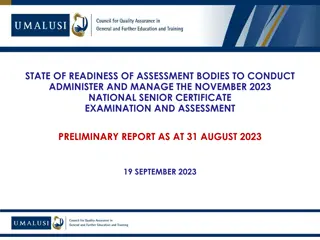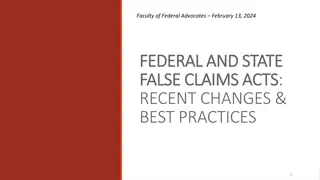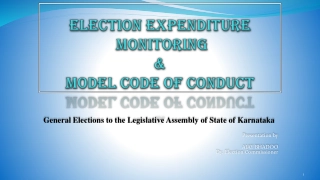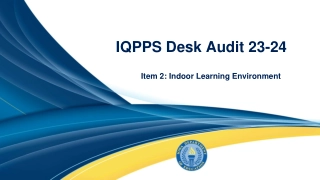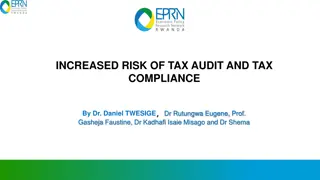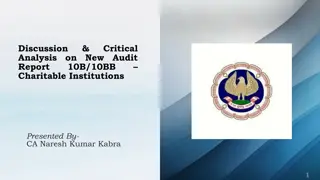Important Provisions of Companies Act Regarding Audit
The Companies Act mandates specific provisions related to audit, including the appointment of auditors, consent, certificates, and rotation requirements. Companies need to appoint auditors timely, obtain consent and eligibility certificates before appointment, and adhere to mandatory auditor rotation for listed and certain classes of unlisted companies. The act applies to various classes of companies based on capital, public borrowing, and company size criteria.
Download Presentation
Please find below an Image/Link to download the presentation.
The content on the website is provided AS IS for your information and personal use only. It may not be sold, licensed, or shared on other websites without obtaining consent from the author. Download presentation by click this link. If you encounter any issues during the download, it is possible that the publisher has removed the file from their server.
Presentation Transcript
Important Provisions of the Companies Act in relation to Audit DATE: January 6th, 2024 PRESENTED BY: Namrata Kamboj MENTORED BY: Isha Chhabra
CONTENT: 1.Appointment of Auditors 2.Types of Company 3.Share Capitalof the Company 4.Registration of Charges 5.Satisfaction of Charges 6.Borrowings by Companies 7.Company Meeting-Board and Members 8.Change in Management of the Company 9.Forms Filed by the Company 10. Minutes and Statutory Register of the Company vkalra.com
APPOINTMENT OF AUDITORS: Section 139 Appointment of First Auditor: The Board of Directors shall appoint the First Statutory Auditor of the Company within 30 days of incorporation of the Company. If the board of directors fails to appoint first statutory auditor of the Company, then members of the Company shall appoint an Auditor within 90 days at the Extra-Ordinary GeneralMeeting. Appointment of Subsequent Auditor: Every Company shall,at the annualgeneral meeting,appoint an individual or a firm as an auditor who shall hold office from the conclusion of that meeting tillthe conclusion of its sixth annualgeneralmeeting and thereafter tillthe conclusion of every sixth meeting. vkalra.com
CONSENT AND CERTIFICATE Before the appointment is made,the following shall be obtained from the auditor: -the written consent of the auditor to such appointment, -eligibility certificate from the auditor which should indicate whether the auditor satisfies the criteria provided in S.141 ROTATION OF AUDITORS Compulsory rotation of auditors by listed companies and certain classes of unlisted companies : a)Individual auditor :not more than 1 term of 5 consecutive years b) Audit firm including LLP :not more than 2 terms of 5 consecutive years i.e.for 10 years. *During the cooling period ( of 5 years) even audit firms having one or more common partners with the audit firm being rotated is not eligible to be appointed auditor of the same company. A cooling-off period is the time period of disassociation of the audit professionals from the audit of the specific client or from the audit firm after completion of tenure,as applicable. vkalra.com
Class of Unlisted Companies on which rotation of Auditor is applicable For the purposes of S.139,the classes of companies shall mean the following classes of companies excluding one person companies and smallcompanies :- Allunlisted public companies having paid up capital of Rs.10 crores or more. Allprivate limited companies having paid up share capital of Rs.50 crores or more. All companies having paid up share capital of below threshold limit mentioned in (a) & (b) above, but having public borrowings from financialinstitutions,banks or public deposits of Rs.50 crores or more. Small company means a company, other than a public Company, whose paid up capital and turnover shall not exceed rupees four crore and rupees forty crore,respectively. Appointment and notice to Registrar The Company shall inform the auditor concerned of his or its appointment,and also file a notice of such appointment with the Registrar in E-Form ADT-1 within fifteen days of the meeting in which the auditor is appointed. vkalra.com
CLASSIFCATION OF COMPANY TYPES OF COMPANY Public Limited Company Private Limited Company Section 8 Company One Person Company Public cum Listed Company vkalra.com
SHARE-CAPITAL OF THE COMPANY Authorised Share Capital : This is the total of the share capital which a limited company is allowed (authorized) to issue to its shareholders. It presents the upper boundary for the actually issued share capital. At times, it is also referred as registered capital. Issued Share Capital: It is the total of the share capital issued to shareholders. This shall be less than the authorized capital. Subscribed Capital: It is the portion of the issued capital, which has been subscribed by all the investors including the public. Paid up Share Capital : It is the amount of share capital paid by the shareholders. DCL covering the share capital areas: vkalra.com
REGISTRATION OF CHARGES: SECTION 77 A Company creating a charge,shall register the particulars of the said charge with the ROC within 30 days of its creation. The charge could be A) on its property or assets or b) any if its undertakings c) whether tangible or otherwise. The Company shall pass the board resolution for obtaining the loan from the bankand financial institution. The duly authorised Director of the Company shall execute the agreement along with others requisite documents from the bank and obtain the copy of it for filing to the ROC. Thereafter the company shall file the E-Form CHG-1 for registration of Charge on MCA Portal, the particulars of charge shall be signed by the charge holder and the company. If a company fails to register the charge within 30 days from its creation, , the Registrar may, on an application, allow such registration to be made within a further period of sixty days after payment of such advalorem fees. The Company cannot create the charge after 90 days from the date of its creation. vkalra.com
PARTICULARS OF CHARGES TO BE CHECKED vkalra.com
SATISFACTION OF CHARGE: SECTION 82 Company shall give intimation to Registrar regarding payment or satisfaction of charge within a period of thirty days from the date of such payment or satisfaction. The Act has allowed intimation of payment or satisfaction to be made within a period of three hundred days of such payment or satisfaction on payment of such additional fees. And if the satisfaction of charge is not filed within 300 days, then the Company shall first file condonation of delay with the CentralGovernment and only then file satisfaction with Registrar. The entries in the register of charges maintained by the company shall be made forthwith after the creation, modification or satisfaction of charge. DCL points covering the charge related compliances: vkalra.com
LOAN AND ADVANCES: DEPOSITS DEPOSIT includes any receipt of money by way of deposit and loan or in any other form by a Company but does not include such categories of amount as prescribed in consultation with the Reserve Bankof India. AMOUNT exempted from deposits: -Any share application money accepted shallbe treated as Deposit if allotment is not made within 60 days. -Customers advances within 365 days. -Any amount received by a company from any other Company shallnot be treated as Deposits. -Any amount received from the government/ authority shall not be treated as deposits. -Any amount received from the director or relative of the director of private company. -Any amount received from banks -Any amount raised by issue of unsecured non-convertible debentures and listed on a recognized StockExchange Important Filing, Every company furnish a return with ROC in Form DPT-3 on or before 30thJune of every year for the period ended 31stMarch as per the information duly audited by the Auditor. vkalra.com
FILING OF DPT-3 UNDER THE COMPANIES ACT, 2013 Form DPT-3 should be filed on or before 30thJune of every year by all the companies' accepting deposits or exempted deposit under Companies Act, 2013 Annual Return Particulars of deposits or exempted deposit as on 31stMarch of that year duly audited by the auditor of the Company shall be furnished. EXEMPTED DEPOSIT POINTS CONSIDERED IN DCL: vkalra.com
COMPANY MEETINGS: BOARD AND MEMBERS KINDS OF MEETINGS Meetings of Creditors Meeting of Debenture Holders Meetings of Shareholders Board Meetings Annual General Meetings Extra-Ordinary General Meetings Statutory Meetings Class Meetings vkalra.com
BOARD MEETINGS: SECTION 173 Essentials of a Valid Board Meeting: Proper Constitution of Board of Directors Due Notice in accordance with the provisions of Section 173 of the Companies Act, 2013 must have been issued to all directors of the Company. Presence of properly elected Chairperson Proper Quorum must be present for due transaction of business Number of Board Meeting: First Board Meeting: First Meeting of Board of Directors within 30 days Subsequent Meeting: - -For One person Company, small Company and Dormant Company: a) At least one meeting of Board of Directors in each half of calendar year. b) Gap between two board meeting shall not be less than 90 days. -For Other Companies: a) Minimum Four Board meetings every year. b) Gap between the two board meetings shall not be more than 120 days. vkalra.com
MEMBERS MEETINGS: SECTION 96 1. Annual General Meeting: - The First Annual General Meeting of a Company shall be held within 18 months from the date of its incorporation. -Subsequent meeting shall be held every year within 6 months from the end of the FY i.e., till 30thSeptember of every year. -Also, not more than fifteen months shall elapse between the date of one annual general meeting of a company and that of the next. -At least clear 21 days notice should be given to members,directors and auditors of the Company. -Every AGM shall be called during business hours, that is, between 9 a.m. and 6 p.m. on any day except National Holiday and shallbe held either at the registered office of the company or at some other place within the city, town or village in which the registered office of the company is situated. - Provided that annual general meeting of an unlisted company may be held at any place in India if consent is given in writing or by electronic mode by allthe members in advance. vkalra.com
2. Extra-Ordinary General Meeting: -An extra-ordinaryGeneralmeeting (EGM) is a meeting other than the AnnualGeneralMeeting of the Company. -EGM is normally convened to dealwith a matter which cannot be postponed tillthe holding of next specialbusiness is considered in EGM. AGM. Only -EGM may be called by or convened: a) The board of directors :Matters which require members approvalproposed by the Board b) Directors on requisition :Directors called the EGM where members holding 10 percent or more capitalhas sent the written request to the Board for calling of meeting. c) The requistionists themselves: Where board of directors fails to call the meeting within 45 days from the date of submission of valid requisition,then EGM shallbe called by the requistionists. d) By Tribunal:When it is impracticable for the company to callthe AnnualGeneralmeeting,the Tribunalmay either on its own or on application made by the director or member,called the EGM vkalra.com
CHANGE IN THE MANAGEMENT OF THE COMPANY Points to be checked during Audit in respect of changes in management: - Whether there has been any change in the directors from the last year as per the Master data of the company - Whether there has been any change in Designation of the directors from the last year as per the Master data of the company - Minutes of meetings of the company need to be checked to identify the changes - Forms filed with MCA to be checked to see if any DIR-12 form for appointment or resignation has been filed at the MCA - Directors appointed other than in the General meeting of the company are categorized as Additional Director - The additional directors shall hold office only upto the date of the next annual general meeting. - KYCs of all Directors must be done vkalra.com
Points to be checked during Audit in respect of changes in shareholding: - Whether there has been any change in the shareholders from the last year as per the Financial Statement of the company. - Whether there has been any event resulting in transmission of shares. - Check transfer deeds and other transfer related documents of the Company with respect to change in shareholding of the Company. - Minutes of meetings of the company need to be checked to identify the changes. - Check the share-certificates entries. vkalra.com
FORMS FILED BY THE COMPANY TO THE REGISTRAR OF COMPANIES vkalra.com
MINUTES AND STATUTORY REGISTER OF COMPANIES - Every company shall maintain the minutes of every meeting held in the Company. - The following chart reflect broad category of meetings for which minutes of the meeting is required to be prepared vkalra.com
STATUTORY REGISTER OF COMPANIES Statutory registers of a company are the collection of register which set out the historical and present details of - members/shareholders of the company - Share transfers - Share allotment - Officers of the Company - Details of charges and its satisfaction Statutory books are usually a bound book or ring binder contained in a boxed register, but with the increased used of technology they can also exist in electronic format. Statutory books should be held at the registered office of the Company. Register Maintained as per the Companies Act, 2013 - Register of Members - Register Allotment and Transfer of shares - Register of Charges - Register of Director and their shareholding - Register of Contract and related party - Register of Debenture Holders - Register of loan and guarantee etc. vkalra.com
Thank You 3rd Floor, MJ Tower, 55, Rajpur Road, Dehradun -248001 T: +91.135.2743283 +91.135.2747084 vkalra.com Follow us on W:
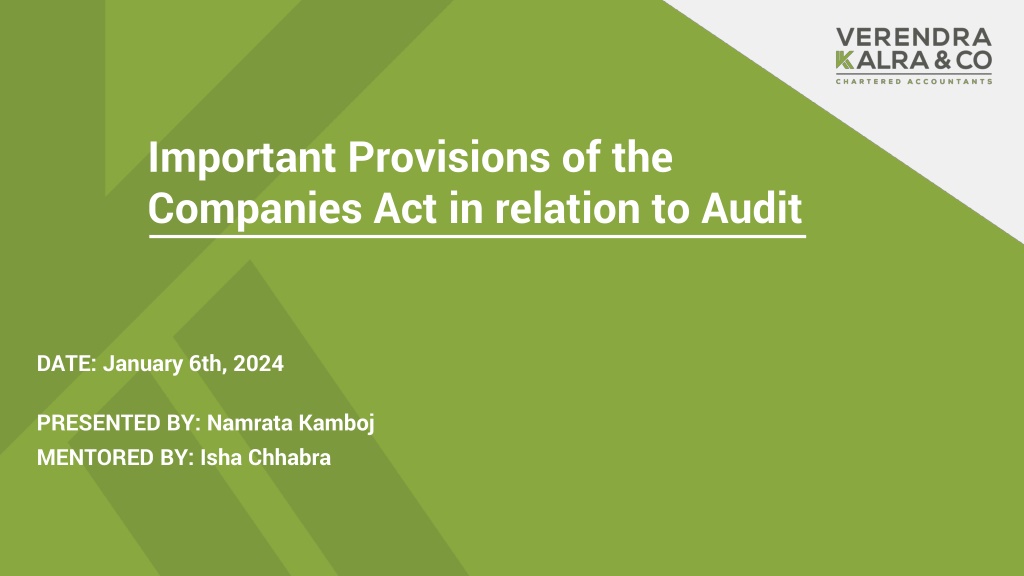






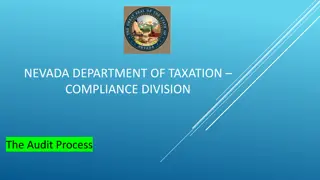
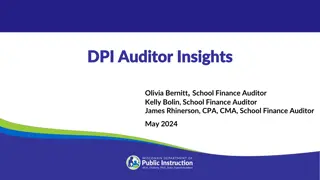

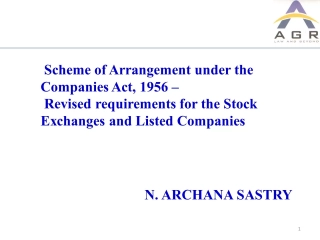






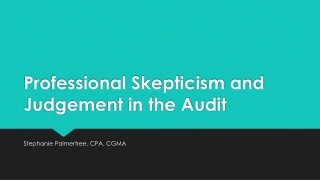

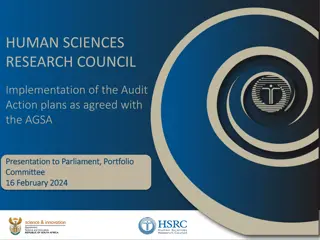
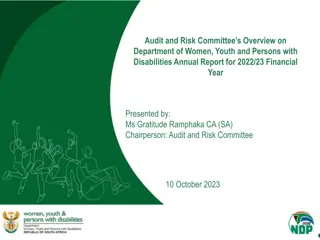



![Enhancing Corporate Transparency: Analysing The Companies Amendment Bill [B27B-2023]](/thumb/60028/enhancing-corporate-transparency-analysing-the-companies-amendment-bill-b27b-2023.jpg)

